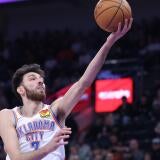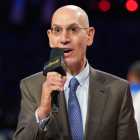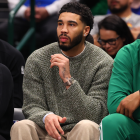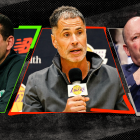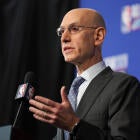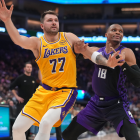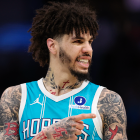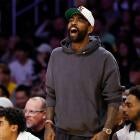
God Shammgod discusses his upcoming Puma collection, working with Luka Doncic, relationship with Kobe Bryant
The legendary ball handler is getting ready to drop his second Puma collection

God Shammgod didn't play 20 years in the NBA, but he undoubtedly helped revolutionized the game. His impact on basketball is global. His game and style in the late '90s was ahead of its time and closely compares to the NBA of today. That's why he's a legend among hoopers and you'll find many a Hall of Famer talk up his influence on ball-handling and basketball as a whole.
Shammgod is now getting ready to drop his second collection alongside Puma. His first drop came over a year ago and was wildly successful and now it's time to do it again. The sequel to the Shammgod Capsule Collection continues to pay homage to his legacy and his timeless 'Cross Ova to God' signature dribble. The collection, featuring the Legacy Shammgod sneaker and a wide array of merchandise, drops on Aug. 21.
Ahead of the anticipated release, Shammgod, who is currently a player development coach with the Dallas Mavericks, spoke with CBS Sports about his basketball legacy, impact on the sneaker community, the NBA's best ball-handlers, Luka Doncic's ceiling and his longtime relationship with the late Kobe Bryant.
CBS Sports: You've had your own Puma collection for a while, now you're getting ready to drop another collection - does any of this feel surreal to you?
God Shammgod: Yeah, it's still not hitting me completely but, you know, I have enough friends and people around me that make me think about it a lot. I know I'm blessed and honored to be with a company like Puma, to have my own shoe. I could have never thought about this in my wildest dreams so that's a blessing within itself. I'm just enjoying the process and having fun with it.
CBS: If I take you back to 1996 or '97 and say in 20-plus years you're going to be on your second collection with Puma and have your name on a shoe, what would have been your reaction at that time?
GS: I would say no way because it was such a different time. That's why it's so full circle for me. When I was playing in '97, I played with a great group of guys in the All-American Game - Me, Stephon Marbury, Kevin Garnett, Vince Carter, Paul Pierce, Chauncey Billups, Antawn Jamison, Robert Traylor, Shareef Abdur-Rahim, the list goes on. It was one of the best McDonald's All-American classes ever and back then everything was word of mouth. Your legacy and status came from people watching you play and things like that. When I was coming up, dribbling was so foreign to people then that it was like if you dribble too much it kind of hurts you and now you fast-forward 25 years later if you can't extend your dribble you can't play in the NBA.
CBS: Every sneaker has built-in details - some of them easier to spot than others - that really make the shoe about the person they're designed after. What are some of your favorite details of the Legacy Shammgod?
GS: When I was young, the main two sneakers were Puma and Converse. Isiah Thomas used to wear Puma. Walt Clyde Frazier was one of my idols growing up, he wore Puma. So Puma was like basketball but it was fashion and I like to feel, not comparing myself to Clyde Frazier, 25 years later I'm the exact standard for that because of my direct relationship between hip-hop and basketball. Mase and Cam'ron, those were my best friends growing up. Being around Diddy, Jay-Z, and Fat Joe growing up and being friends with them you had to have swag, you had to be able to dress. So when I got to my sneaker journey I wanted to take those elements from my past. If you look at my sneaker, I have concrete on the side because it reminds me of where I come from, the 'concrete jungle.' On the new shoe, we added a white zigzag that's for the crossover move. So on the shoe, it looks like the ball is being thrown out and then snatched back. The black, red and white were my high school colors. My initials, my name going down the side to just represent me and what I've been through.
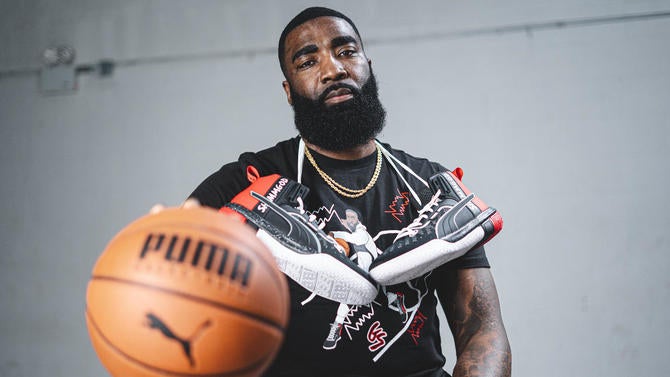
CBS: Your collections are full of items that you will see people in the streets of New York wearing - how has it been knowing that the people you represent will wear items from your collection proudly?
GS: I always wanted to make a shoe and a collection that whether or not someone wears all the pieces, they could definitely wear one piece with anything else. They could wear the jacket or the shoes. They could wear the shirt with some jeans and some Timberlands and still look cool. Growing up in Harlem, it was built on swag and bravado and looking the part. And when I started playing basketball at Rucker Park, you couldn't just play basketball you had to look good too. That was embedded in me since I first fell in love with basketball so that will always be a part of me.
CBS: You spoke on ball handling and how the perception has changed. It's widely regarded as almost being an artform now. You're probably one of the best people to ask this question - when you look at the NBA now, who are your favorite ball handlers?
GS: Stephen Curry, Kyrie Irving, James Harden. Some of the younger guys too, Ja Morant, Trae Young, Kemba Walker. I feel good because, at some point in their life, I was a part of it. Whether I was directly a part of it or not. When I first met Chris Paul he was like 'man, growing up I watched you and Tim Hardaway. If it wasn't for y'all I wouldn't have wanted to play basketball.' That's an amazing feeling. Trae Young, I've known since he was in 10th grade, we talk about basketball and different things. Ja Morant, me and his father are really close, I've talked to him since he was in college to give him advice here and there. Being able to do that feels good. And now being a part of an organization like the Dallas Mavericks where I get to work with a guy like Luka Doncic every day, Kristaps Porzingis, Tim Hardaway Jr., Seth Curry - that just helps me continue to build a part of my legacy. In this era of social media, that stuff is so valuable when it comes to me because in real-time people couldn't see it but the youth and everyone can see it now.
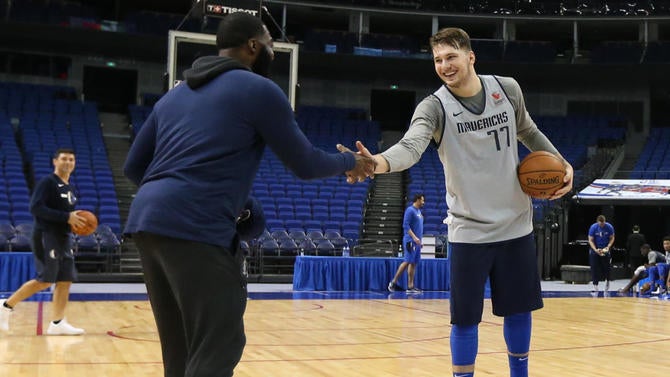
CBS: As someone who is in the building, what can you say about Luka Doncic that the public might not know and how high do you think his ceiling is?
GS: I believe he has a chance every year to be MVP. Every year, I know he's going to be a top-five player. He's such a sponge, it's like any little thing you give him he takes to the highest level and that's the best thing about working with him. And it's not just one-sided, I learn from him just as much as he learns from me. I talk to him just as much as he talks to me about how we see the game. We have video sessions breaking down film. Then for me to see it first hand is amazing. But it's not just him, look at how much Seth Curry has evolved. He went from being just one of the Currys to now he has his own identity. Look at Tim Hardaway Jr. and how he's evolved. Me being able to be right there and going back and forth with the guys helps them and it helps me. That's just a beautiful feeling.
CBS: I know you had a relationship with Kobe Bryant from early on, how would you say you helped him and how did he help you as a basketball player?
GS: He was just super sure of himself. He was determined. I don't think I'll ever meet anybody that was as determined as he was. He took a lot and still pushed through, it's amazing to think of the things he did. When I first met him, his father wanted me to teach him how to dribble because he already knew how to shoot and he knew how to do all the other stuff. Those moments turned into a 25-year relationship to the point where he would call me to help train his daughter, who had the same type of passion and determination. Back then I would call him, pick his brain and bring players in the summer to work with him. When I was growing up I really didn't have so many mentors so I always said if I ever had the opportunity I would give back in that way. The mental aspect of the game, not just teaching a skill because anyone can learn a skill. The mental aspect of wanting to be that good and working to be that good, that I learned from Kobe. I remember one time he told me 'don't worry about it, if you're that good they'll change for you. You won't have to change for them.' And that's what he did.

